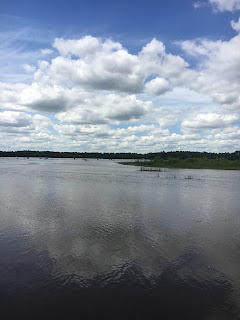This summer, my research team explored the potential
for biochar to combat nutrient pollution in aquatic environments. Arthur,
Madeline and I went through the process of biochar creation in a laboratory,
and employed various chemical treatments in order to study which method most
effectively extracted phosphorus from lake water samples. Biochar is a stable
solid that is formed through pyrolysis, the burning of organic matter in the
absence of oxygen. This results in a charcoal compound that can be treated with
metallic compounds in order to extract aquatic pollutants such as nitrogen (N)
and phosphorus (P). The extraction process occurs through chemical binding, in
which positively charged metals used to treat the biochar attract the
negatively charged phosphorus and nitrogen ions suspended in the lake water.
Biochar has additional uses besides nutrient extraction. It can function as a
carbon sink, plays a role in pollution remediation, and can be used a soil amendment
to facilitate the growth of terrestrial plants.
Through
the following chemical treatments, my research team and I were able to
determine which methods showed the most potential for nutrient pollution
reduction. Method 1 consisted of magnetite (Fe3O4),
Method 2 consisted of iron (II) sulfate heptahydrate (FeSO4⋅7H2O), Method
3 consisted of commercial biochar (treated with magnesium and aluminum), and
then we had a series of untreated biochar, and untreated biochar with a water
rinse. We pyrolyzed two types of organic matter—buckthorn and reed canary
grass. Both of these species are invasive in the Wisconsin area, indicating
that biochar can be used to combat invasive species and prevent further
ecosystem disruption. Our results showed that Method 2 for buckthorn was the
most effective at removing phosphorus. We found that buckthorn Method 1 also
showed a decrease in phosphorus, thought it was only a slight reduction and was
not as consistently effective as buckthorn Method 2. Finally, we found that in
the case of reed canary grass, all of the chemical treatment methods ended up
adding phosphorus to the system. Though these findings were relatively
unfortunate in terms of reed canary grass’s potential to be used in biochar,
they did suggest that this species could be used for soil amendment, as
terrestrial plants could rely heavily on the high amounts of phosphorus for
growth. My team and I also performed calculations to determine the sheer amount
of biochar that would be needed to fully combat the daily inflow of phosphorus.
We calculated that approximately 40,000 pounds, or about 20 tons, of biochar
would be needed to reduce the phosphorus pollution that is deposited on a daily
basis. Overall, our experimental results indicate that the phosphorus extraction
ability of biochar largely depends on the source material used and the chemical
treatment method employed.
Reflecting
back on this summer, I have come to truly appreciate how much I have learned
and the different ways in which I have grown. Primarily, I was able to develop
the scope of my scientific knowledge. I have familiarized myself with a variety
of new laboratory techniques, such as SRP and TP analysis, centrifuge and UV
spectrometer operation, chemical agent preparation, and biochar treatment with
metallic compounds. I was also able to hone skills found outside a laboratory
environment, including interviewing and public speaking, connecting with
members of the Menomonie community, and branching outside of my comfort zone
with activities such as tractor driving, canoeing, and some intense biking.
I have also noticed the
ways in which I have changed as a person. First, I have become more confident
in myself, both as a student and as a friend. I fostered good connections with
my fellow researchers and mentors, and was able to better understand the
qualities that I look for in others. Additionally, I was able to dive into
things that make me content, such as spending time in nature, biking, and being
with people who share similar passions to me. Finally, I am grateful that I was
lucky enough to befriend nine incredibly smart, fun, and thoughtful women. I
made some excellent friendships and experienced different schools of thought
from students that were from all over the United States. I was glad to be the
only one from my state that participated in this program, because I feel like
this position helped me to focus on environmental issues that are not exclusive
to my hometown.
This program has also
enabled me to further myself career-wise. I have experienced two months of
focused research, and produced a graduate-school level scientific poster.
Researching critical environmental problems that have a significant effect on
the Menomonie community has made me more aware of the scale of anthropogenic
climate issues. I have also refined my scientific interests in terms of wanting
to go into a research field, and have become more confident about going to
graduate school. I would still like to learn more about the various fields I
could go into, but I have heard positive things about obtaining a master’s
degree. Overall, I had a fantastic summer and I am thrilled that I was chosen
for this experience.

































